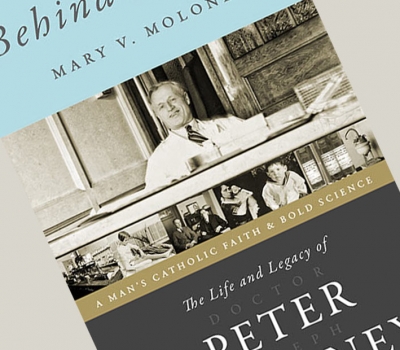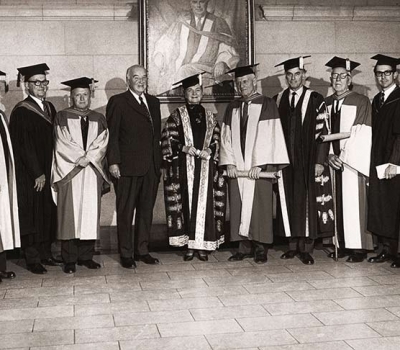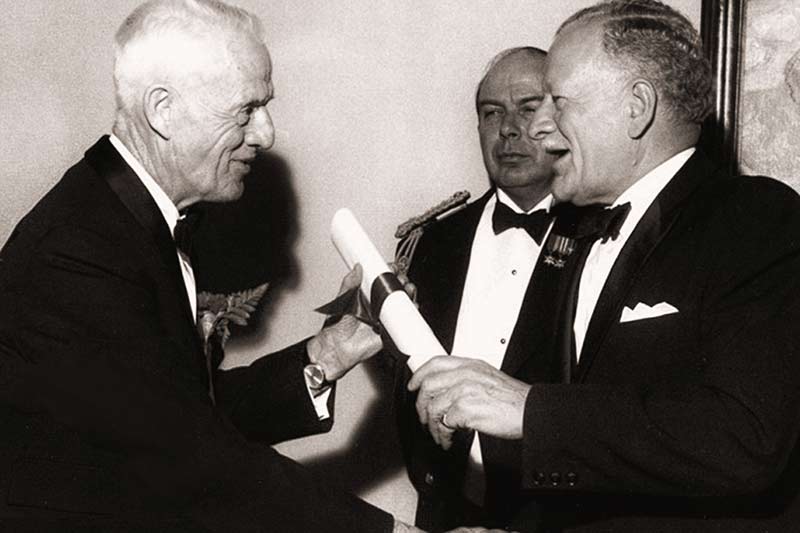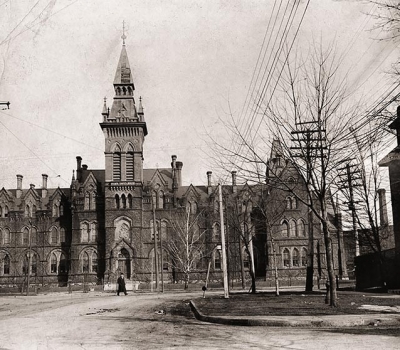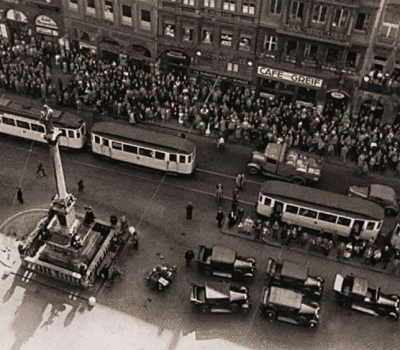Dr. Peter Joseph Moloney, Ph. D., LL.D., O.B.E., F.R.S.C., has made internationally recognized contributions to chemical and immunochemical research, leading to improvement in the field of medicine. In this little book he draws upon science and the Christian Faith in his reflections upon human life.
December 8, 1984
In the western world there has been a marked worsening in many aspects of life. In large cities an elderly man or woman walking alone late at night is in danger of being attacked, robbed or even killed. In some cities this type of crime is carried on by gangs of teenagers and these same gangs break into isolated houses where they know there are only two or three elderly dwellers, terrorize them, assault them, rob them and sometimes leave them for dead.
Rape with violence and death is not rare. There is an alarming increase in illicit sexual relations. Moral standards with some are all but gone and there appears to be an increase in disbelief in the existence of God. Great nations cannot trust one another, and there is terror the world over that atomic war is inevitable. Such a war would kill millions directly and the cloud of atomic material released would kill multitudes later. Such a cloud might envelop the whole earth so that all mankind would be wiped out.
For Christians and others, prayer is part of our life. Let us pray that the black cloud of evil that hangs over us be lifted.

What follows concerns the Faith, its authenticity and the reasons why we should hold fast to it, with comments on evolution.
On the Faith
After the New Testament had been written there was writing in defense of the Faith by four early Christians. They were great men, all saints, who gave their lives for Christ. They were: Ignatius, Bishop of Antioch, born before Christ was crucified; Polycarp, Bishop of Smyrna, born in 67 A.D. and instructed by St. John the Evangelist; Irenaeus, born in 125, instructed by Polycarp and sent from the Near East to be an early bishop of what is now Lyons in France; and Justin the Martyr, born about 100. He was educated in the Greek schools. Of great interest to him was how to lead a good life. In the end he came in contact with an old man, a Christian, and this was the first step in his becoming a fervent and intelligent convert.
Irenaeus, reminiscing in his later years, wrote to his friend Florinus in these words: "I could tell you the place where Polycarp used to sit when he was preaching. I can still see him going in and going out; his walk, his appearance, his discourse - all are engraven on my heart. I seem to hear him yet telling us how he had conversed with John the Evangelist, and with many others who had seen the Lord. I seem to hear him tell us their words, and all that he had learned about Jesus Christ, His miracles and His doctrines. I listened to all these things then; and wrote them, not on paper, but in the depths of my heart, and always, with the grace of God, shall I lovingly dwell on them."1
Without going into details of the individual writings of these four great men, the substance of their belief was the following. They believed in One Almighty God, and in the Blessed Trinity, that is, Three Persons in One God. They believed that Jesus Christ was God the Son become Man, born of the Virgin Mary. In his epistle to the Ephesians St. Ignatius proclaims: "There is one supreme doctor of our souls, flesh and spirit together, created and uncreated, God existing as man, true life in the bosom of death, at once of Mary and of God, passible and impassible, Jesus Christ Our Lord.2 They believed that by His death Jesus Christ redeemed the world.
They believed in Baptism for the forgiveness of sins, both original sin and personal sin. After His Resurrection Our Lord empowered the Apostles to forgive sins, saying, "whose sins you shall forgive, they are forgiven them; and whose sins you shall retain, they are retained."Jn 20:23. They believed in life everlasting. They believed in the Mass. Justin described a Mass he assisted at in Rome. At that time a persecution of Christians was underway. In such circumstances Christians were advised to come to Mass in small numbers. Those who came risked their lives. In the words of Justin: "Then he who presides (that is to say the Bishop), is offered bread and and cup of wine mixed with water. He receives them and gives thanks to the Father of all things in the name of the Son and of the Holy Spirit. When the thanksgiving is over, the people say 'Amen'. Then those whom we call deacons distribute to those present, and carry to the absent, the bread and wine that have been consecrated. This nourishment we call by the name 'Eucharist'. And we partake of It, not as ordinary bread and drink, but just as by the words of God, Jesus Christ Our Saviour was made flesh, and took on body and blood for our salvation, so this nourishment, consecrated by the word of Christ, is His flesh and His blood."3
They believed in the supremacy of Peter. On one occasion Christ said to Peter, "Thou art Peter and on this rock I will build my Church and the gates of hell shall not prevail against it." Mt 16:18. And He continued, "And I will give thee the keys of the kingdom of heaven, and whatever thou shalt bind on earth shall be bound in heaven, and whatever thou shalt loose on earth shall be loosed in heaven." Mt16:19. Christ thus conferred on Peter the gift of making no mistakes in matters of faith and morals; a gift which was later authoritatively named infallibility.4
Belief in the supremacy and infallibility of the successors of Peter has always been held in the Church. In 95 A. D. the faithful in Rome were undergoing a cruel ordeal. As soon as the persection ended, Clement, who was the third Pope after Peter, sent an embassy to Corinth, where there was internal trouble over a matter of fatih. They carried a letter from the Pope giving several pieces of good advice to the troubled community. He spoke with striking authority, giving his instructions quite categorically, in the tones of a man who intended to be obeyed.5
Even though there have been developments in the life of the Church, it is the same Church now as it was in the days of the Apostles.
At one stage in my life I thought that writings from the second century were far removed from the early life of the Church. I do not think that now, when I consider the life of my own family. My youngest grandparent, a grandmother, was born in 1828. As a young man in my twenties I have spoken with both my grandmothers. Let us suppose my younger grandmother was born not in 1828 but in 28 A. D. Then all my grandparents would have been born before Christ was crucified. My father would have been born in 52 and my mother in 60. Let us suppose further that they were born in Israel and that they became Christians. It would have been possible for my parents to have met St. John the Apostle and St. Polycarp. I would have been born in 91, about nine years before Justin the Martyr. In respect of age I could have been the father of St. Irenaeus, born in 125. For me, now, the second century seems very close to the Church of the Apostles.
Christ has told us, "Beware of false prophets, who come to you in the clothing of sheep, but inwardly they are ravening wolves." Mt 7:15. And from the early days of Christianity there have been false prophets who were responsible for changing doctrines and fragmenting the Church. Let us always pray that the Church will be protected.
During His public life, Our Lord showed compassion for the sufferings of others by miraculous healing, by raising the dead to life, by the feeding of thousands on a few small loaves, by restoring peace to sinners.
There was one miracle which was of special interest to me. It was the raising of Lazarus from the dead.
Lazarus was stricken with a mortal illnss. His sisters Martha and Mary realized that the end was near and they sent for Jesus, Who was delayed four days in coming.
When Martha learned that He had reached the outskirts of the village where they lived she went to meet Him. Her first words were, "Lord, if Thou hadst been here, my brother would not have died." Jn 11:32.
Near Jesus and Martha was a group of Jews, friends of Lazarus and his sisters.
When Martha and Jesus turned to go to the tomb, where Lazarus lay, the Jews accompanied them. Arrived at the tomb, Martha's words were words of death, "Lord, by this time he stinketh, for he is now of four days." Jn 11:39.
Jesus asked that the stone blocking the entrance to the tomb be removed.
Then He called out, "Lazarus, come forth." Jn 11:43. When Lazarus came out, Jesus asked that the bindings on his legs be removed, so that he could move more freely.
The Jews acknowledged that a great miracle had been performed and many received the gift of faith.
And now to return to why the miracle is of interest to me. It has to do with what was told me by an old Frenchman in Belgium some years ago.
He told me that when he was a small boy, in France, he was deathly sick, and after a few days the attending doctor declared him dead. The doctor, in duty bound, notified the local authorities, and the father in turn was obligated to inform the authorities regarding the place and time of burial. But there was no word from the father and two officials were sent to his house to investigate. By this time the little boy was well on the way to recovery. The officials saw him and asked the father, "How did you know he was not dead?" The father replied, "I was a soldier of France. I served in North Africa. I have a nose. I know when a man is dead."
Here are two instances of return to normal life: the recalling of Lazarus to life after four days of entombment and the recovery of the little boy after a few hours of presumed death. The two cases are distinguished the one from the other by the sense of smell.
On Love
St. John in his First Letter has told us of God's love for us: God gave His only son because He loved us. And we, if we are to love God, must love one another. cf 1 Jn 4:10-12. Christ has told us of the height to which this love can rise, when He said, "Greater love no man hath than he give his life for his friends." Jn 15:13.
We know that selfishness is the very opposite of love, so the words love and unselfishness can often be used interchangeably. We know that unselfishness is required to keep the commandments; this at times can be a difficult assignment. But we can be heartened by the words of Christ, "If you love me, keep my commandments." Jn 14:15. And if we struggle with God's help to keep the commandments, we are indeed loving God.
As Catholics we know that if we wish to keep the commandments, we must pray and have recourse frequently to the sacraments of Confession and Holy Communion.
There is one commandment Christ gave us that seems almost impossible to fulfill, when He said, "Love your enemies." Mt 5:44. I was once very much concerned about this commandment. It was on a Saturday when we had to work. I had had high words with a man and in the end I decided that I hated him. On my way home I called at a church where I usually went to confession to a certain priest. At first I decided not to go to confession since afterwards I would hate the man as much as before. Finally, however, I went in and began by saying, "I can not receive absolution because I hate a man." The priest, a wise man, asked me with his characteristic Scottish accent, "Do you wish his eterrrnal damnation?" "O, not at all," I answered. Then he said, "There is no need to worry." And neither there was, because it implied that I wished his eternal salvation. It seems odd, that after absolution I had no resentment whatever against the man and could have received him as a brother.
If the case arose where a man molested and killed one of my children, I would approve of any punishment he would receive, even death if it were the law of the country. But I would still say, regarding him, "Lord, have mercy on his soul."
The God-given attraction of young men for young women and young women for young men is an aspect of love. But we must remember that unless one has the firm intention of keeping the commandments, he can not in reality love another, since he might lead the other astray to the point where they both fail to love God. Real love between man and woman demands that they have the intention of keeping the commandments and so showing that they love God.
When Pope Paul VI issued the Encyclical Humanae Vitae condemning the use of contraceptives, many seemed to think he was inventing new sins. But this of course was not so. This particular teaching of the Church was certainly known to ordinary Catholics long before the encyclical was issued. In effect, this type of sin was condemned in the Old Testament.
One of the possible consequences of the use of contraceptives is that selfishness can be induced. A story was told me by a woman highly trained in counselling. A young Catholic woman, whose husband was also a Catholic, came to her in distress. She said that she had been using the contraceptive pill since the beginning of their marriage. Two or three years later she was not feeling well and she decided to consult her doctor. After consultation his advice to her was that she stop using the pill. When she went home, she told her husband. He said, "We don't have to follow his advice. We can take a chance." Then the poor woman broke down with the words of agonizing despair, "I don't think he loves me any more." And obviously he did not.
The selfishness that can be induced by the use of contraceptives can lead to infidelity, as Pope Paul warned in the Encyclical.
The forbidding of contraceptives does not imply that the size of families can not be limited. This is a matter of conscience for the two concerned. There is a law of physiology that conception can take place only within a limited period each month. If the man and wife love God, and in reality love each other, it is possible for them, for sufficient reasons, to limit the number of children in their family. This kind of limitation, since it implies unselfishness on the part of husband and wife, is essentially different from limitation by contraceptives. In any marriage there should be no thought of limitation until at least some children are born. After all, marriage is for children.
As Christians we must do what we can to bring back respect for the God-given Commandment "Thou Shalt Not Kill"; abortion and so called mercy-killing come to mind.
The father is less often with the children than the mother. But he should make his presence known as much as possible. From the earliest days, before being weaned, the child should hear the voices of the parents talking together. Before the father leaves for work, short prayers should be said before breakfast. And after the evening meal, the whole family should kneel down together for night prayers. The parents in the evening, talking together, should welcome the presence of their children, and show a real interest in their studies, as well as in their hobbies and other types of healthy activities. On Sundays and other suitable days the children should accompany their parents to Holy Mass.
The love between a married couple that is based on the love of God will be alive until their last days. This is the very road to happiness.
My Young Life
By the grace of God my parents had the privilege of bringing their children through Baptism to the Christian way of life. they in theri turn had the duty of leading a good life, and of showing in their daily lives something of the unselfishness of Christ.
I started to school in 1896, and the next year my father died. It was said that he had pneumonia, and my mother, as she did every day, wanted to remake the bed. Father got up and lay down on a couch in the room and almost immediately died. I had a little cot in the same room and I was asleep when this happened. I was awakened by a noise, probably my poor mother weeping. Dr. Porter was there, rubbing father's chest, I think with alcohol. I remember my two older sisters, Elizabeth and Ella, little girls ten and eleven years old, standing in their night-gowns, calling out together, "Mother, we'll work for you." And so they did, all their lives. My father was buried in Barrie. He had died in November, the feast of St. Andrew. There was snow on the ground and when the remains were taken to the railway station, the coffin was placed on a horse-drawn sleigh, they type farmers used. Going to the station there was Mr. McArthur the undertaker with the pall-bearers near the coffin. Then came my mother with her three children (my sister Henrietta was born three months after father died). Next came the village band with a group of townspeople following. Mr. McArthur nodded to Les Phillips the bandmaster and the solemn music began. The funeral march ended at the railway platform. There we were, Presbyterians, Anglicans, Methodists, and, ungrammatically, us. That day a tribute was paid to my father and to my mother, as good citizens and good people. In Powassan in 1897 there were few Roman Catholics. We did not talk about ecumenism. But when there was trouble, we stood together.
Years later there was another death - my mother's. Word came to me that Mother, who was seriously ill, was worsening. I came at once, with Henry, my eldest son. I knelt near the foot of Mother's bed, with my sisters Elizabeth and Henrietta, and Henry. I began the Litany of the Blessed Virgin Mary and the others responded. When I was partly through the prayer, I knew my voice would break and I asked Henry to carry on. When he reached the end, Mother was dead. It was the death of a strong and holy Catholic woman. We were all very tired and we left the room to have a short rest.
But to go back to the years after father's death. Mother carried on, good Christian that she was. There were family prayers each day. We all had to kneel down after supper; there was the Rosary, and as it seemed to me, a small boy, endless other prayers. We were taught the rudiments of the Faith and we knew there was right and wrong. And when there was Holy Mass, we attended Mass. Our pastor was a good priest whose visits to our village were limited since he had under his care many missions scattered miles apart, which he visited by horse-drawn vehicles in summer and winter. In his sermons he did not mince matters, whether it was a question of faith or morals. Sin was acknowledged and was to be avoided. When he prepared us for First Communion, there was also first Confession, and this came first. This is what we were taught and it impressed us with the need to receive worthily Our Lord in the Blessed Sacrament. For us there was not the slightest danger of being mentally warped by going to Confession at an early age.
Regarding first Confession, a close friend of mine, a man who, it seemed to me, was always wise, told me the following. As a little boy he was waiting to make his first Confession and noticed that in front of him a boy was sobbing. He tapped the boy on the shoulder and asked, "What's the matter?" "I swore a thousand times a day," the boy replied, "and I don't know what to tell the priest." "Tell him that," was the reassuring answer. The boy came out of the Confession smiling and comforted.
On Belief
I remember as a young man hearing a certain adult declare that he "didn't believe nothin", and in what seemed to be a burst of family pride, he added, "Brother at home believes less."
If the man referred to belief in general, he was talking nonsense. If we think of what we know, our knowledge can be divided into three classes: what we learn by experience: a child is not very old when he learns that if he puts his hand on a hot stove, he will be hurt; he knows at once the difference between the taste of maple syrup and that of sour pickles. And so through his senses, knowledge is acquired.
Another source of knowledge may be thought of as that which comes by struggling to solve problems; it may be solving a mechanical or a mathematical problem, or any of the various problems that present themselves to man.
And finally there is knowledge by faith. It is generally accepted that man walked on the moon; that there was a man called Hitler and a man called Stalin, both of whom were guilty of unspeakable cruelties. And one could go on citing historical knowledge to no end, all based on faith. We know that Christ and His apostles walked on the earth. This historical knowledge that we have of Christ is not by itself religious faith, but it is a step toward it.
Belief in God
One can first consider the question of belief in God not as dealt with in the Scriptures, but from human considerations.
Animals are endowed with instinct, as we observe in fish and birds, in insects and worms. But man stands on a different plane. Apart from instinct which he has, man differs colossally from any other species of animal: in his inventiveness, in appreciation of beauty, in his mathematical skills, in his compassion.
We are rational men and women. We can not believe that we were tossed up by random chance. No, it was by the Intelligence and Providence of God, the Creator of the Universe that life appeared on our planet, the Earth.
Looking upon the various races in the world, races with widely differing characteristics, some will ask "But are they all men?" The answer can be found in marriage. From a marriage between, for example, a black person and a white person, the children are unquestionably rational human beings.
In the part of Holy Scripture called the Old Testament, is found the history of the Jewish people. To them God gradually revealed Himself. And to them He gave the moral code called the Ten Commandments, the observance of which leads to a stable world. Their non-observance leads to chaos.
There are in the world millions of men and women who believe in a future life and in God. Christians, however, have a firm foundation for belief. Christ is seen through His witnesses, the Apostles. The Christian is still touched by the peace Christ brought, by His mercy, by His healing. St. Peter the Apostle says, "Through Him you are believers in God."
Comments on Evolution
Evolution is attractively presented in books, in review articles, in the press, in some schools and in the home by radio, either sound alone or T. V. And its propaganda is effective.
It has been observed that some who are exposed to these ideas, lose their faith in God.
In discussing evolution attention can be focussed on what is said about the spontaneous generation of life, about life from its first appearance as plants and animals, and about man.
A visiting teacher, known to be a wise man, was invited into a classroom of young adolescents, who had some questions on evolution to ask him. When the questions had been asked and dealt with, the visitor in turn asked a question, "What is the animal closest to man?" "Monkeys" was the nearly unanimous reply.
In commenting on evolution it is in order to say something about the remarkable and interesting molecule DNA. A given DNA carries the code specific for the formation of a given protein. There are thousands and thousands of different proteins, hence there must be thousands and thousands of different DNA's. Among the proteins there are the insulins. The structures of at least three of these are known: ox (beef) insulin, pig (swine) insulin, and human insulin. It happens that human and pig insulin are almost identical. There is ony one difference, the terminal amino acids are not the same. Pig insulin can, by a relatively simple chemical and enzymatic operation, be changed to human insulin. Chemically pure human insulin, prepared in this way, is distributed in Canada for the treatment of diabetics.
There is another source of human insulin. Based on brilliant work already done, DNA was taken from the islet cells of human pancreas and incorporated into Colon bacillus. The Colon bacillus divides every half hour at body temperature to give daughter cells that contain the properties of the original cell; and in the case of the Colon bacillus containing the incorporated human insulin DNA, its daughter cells produce human insulin. Human insulin is produced at a rapid rate in this way, and this insulin is made and distributed in the United States.
Evolution is full of unproved theory, and this is admitted by those who are most knowledgeable, since the theory is constantly being changed. Note that evolution did not contribute to the production of human insulin from pig insulin nor to its production in the Colon bacillus.
Let us return for a moment to the question, "What is the animal closest to man?"
It was thought that leprosy was a uniquely human disease, since it was not found among any of the animals observed. Leprosy has associated with a certain bacillus, the Leper bacillus, which grows slowly in vitro. Someone, with a culture of Leper bacillus, injected it into an armadillo, an animal found in Louisiana and Texas. The animal died. This of course does not mean that it necessarily died of leprosy. But it was found after the animal's death that an extract from its tissues yielded a fluid that gave a positive skin reaction in lepers but not in normal subjects, indicating that the armadillo is probably a carrier of leprosy. One might say that in respect of leprosy the armadillo can be considered closer to man than any of the animals so far observed.
I remember that during the 1918 plague of influenza, monkeys were chosen as possibly useful animals for the study of the disease. However, the injection of the virus into monkeys showed no detectable symptoms. A number of years later it was found that the ferret when injected with influenza virus, became fevered. The ferret is so specifically sensitive that it is used at the control centre at Atlanta, Georgia, to identify as influenza, strains of different types which are submitted for different parts of the world. This points to the fact that with respect to the influenza virus, the ferret is close to man.
In Outer Mongolia, typhus was still endemic in the 1920's. It is a disease spread by body lice and has a high mortality. An Order of priests from Belgium sent missionaries to that part of China and almost every year some would die of typhus. An effective vaccine against the disease was discovered. It was prepared in this way: healthy body lice were fed on normal human blood; they were then injected with the causative agent of typhus, which flourished in such lice. From these, the the causative agent was harvested, and inactivated to give the vaccine. There were no more deaths from typhus among the Belgian missionaries after they had received this type of vaccine. The vaccine had been prepared at the Catholic University of Peking. We might add that when the virus is injected into the yolk-sac of fertile hens' eggs. these infected eggs serve as a more convenient source of the effective agent for the production of typhus vaccine. For the disease typhus, two animals closest to man are the body louse and the chick embryo.
It would of course be blind prejudice to assume that monkeys or apes can never be useful in investigation human diseases. Sometimes they are useful. It was found that polio virus brings about paralysis in monkeys. Later it was discovered that monkey kidney cells can be grown in tissue culture and that the virus of polio flourishes in such cells. The harvested virus, suitably treated, is used as an effective vaccine against polio.
There is a book which was published in 1941, entitle L'Origine des Especes by Emile Guyenot, a Swiss citizen, a professor in the Faculty of Science of the University of Geneva, and a member of the Institute (Swiss). A later edition was published in the United States and Canada in 1964 under the same title, The Origin of Species. Guyenot was an honest man and before he accepted the invitation to write on the subject, he stated his position: that he would reveal a larger number of difficulties than of certainties.
To mention only one uncertainty he posed a question, "how to acquire from a series of chances a new organ, with the innumerable connections necessary for its functioning." He considers the formation of an eye. "Would it be by chance that the brain, having produced an optic vessel, the skin alters in contact to produce a lens by chance?" He mentions eighteen necessary chances that would have to occur to explain the complete functioning of two eyes operating in concert. And he adds, "A prodigious chance, and truly providential. Here the mutationist explanation comes up against a genuine impossiblity."8
In the spirit of St. Paul I can say, "I am not ashamed, for I know whom I have believed, and I am sure that He is able to guard until that Day what had been entrusted to me." 1Tim 1:12.
Nevertheless, as a Roman Catholic, I do not judge myself worthier in the sight of God that any man, woman or child on the face of the earth. Almighty God is the Judge of the worthiness of each of us.
References.
1. Ryan, Legionaries of Christ p. 20. BRITON'S CATHOLIC LIBRARY.
2. ibid. p. 27.
3. ibid. pp. 51-52.
4. Vatican Council I, Dogmatic Constitution PASTOR AETERNUS
5. Daniel-Rops, The Church of the Apostles and Martyrs Vol. I p. 315 IMAGE.
6. The Catholic University of Peking was established in 1925 by the Benedictines.
7. WHO'S WHO IN FRANCE Sixth Edition - entry on Emile Guyenot.
8. Emile Guyenot, The Origin of Species, Pp. 127-128; in the series on aspects of biology and medicine. A WALKER SUN BOOK.


